利器 | REST Assured 实践(二):断言实现

在上一篇文章中,我们初步探讨了 REST Assured 的应用实践,还有很多丰富的用法需要慢慢探索研究。而 REST Assured 提供的完整断言手段,是测试工程师最常用最重要的功能之一。断言该如何使用呢?
这里以 rest-assured 官方给的一个示例做演示学习
{
"lotto":{
"lottoId":5,
"winning-numbers":[2,45,34,23,7,5,3],
"winners":[{
"winnerId":23,
"numbers":[2,45,34,23,3,5]
},{
"winnerId":54,
"numbers":[52,3,12,11,18,22]
}]
}
}
在本地使用 python -m CGIHTTPServer 临时搭建起一个服务:
根节点.子节点
1)我们可以使用根节点.(点)子节点的方式一层层的找下去,例如我们需要对lottoId等于 5 进行断言:
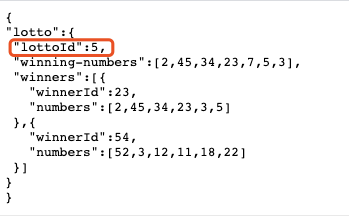
@Test
void testGPath(){
given().when().log().all().get("http://127.0.0.1:8000/restAssured.json").then().log().all().body("lotto.lottoId",equalTo(5));
}
2)如果我们想要断言winners数组下面的winnerId,检查23和54是否包含其中,可以如下lotto.winners.winnerId写法
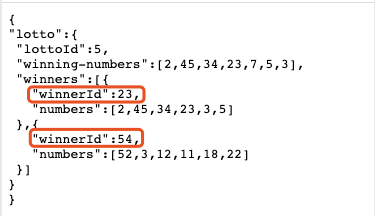
@Test
void testGPath(){
given().when().log().all().get("http://127.0.0.1:8000/restAssured.json").then().log().all().body("lotto.winners.winnerId",hasItems(54,23));
}
索引取值
1)如果我们想要取某些相同字段中的某一个,可以使用类似索引的方式获取,例如想要断言 winners 数组下面的 winnerId 的第一个值是否为23,可以使用 lotto.winners.winnerId[0],写法如下:
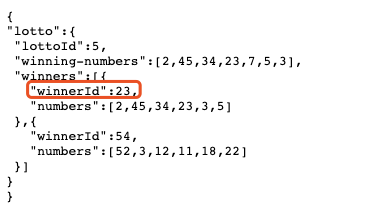
@Test
void testGPath(){
given().when().log().all().get("http://127.0.0.1:8000/restAssured.json").then().log().all().body("lotto.winners.winnerId[0]",equalTo(23));
}
2)如果我们想要取某些相同字段中的最后一个,可以使用 -1 作为索引,例如断言断言 winners 数组下面的 winnerId 的最后一个的值是否为 54
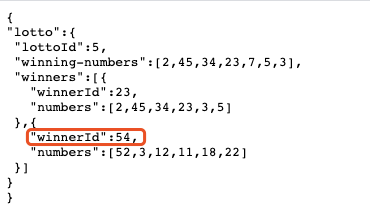
@Test
void testGPath(){
given().when().log().all().get("http://127.0.0.1:8000/restAssured.json").then().log().all().body("lotto.winners.winnerId[-1]",equalTo(54));
}
findAll
有时候我们需要获取符合某些条件的结果来进行断言,这里 findAll 可以帮助我们实现,我们可以在 findAll 方法中写筛选条件,例如我们想取 winnerId 的值在大于或等于 30 小于 60 之间的结果进行断言,具体写法如下:
@Test
void testGPath(){
given().when().log().all().get("http://127.0.0.1:8000/restAssured.json").then().log().all().body("lotto.winners.findAll{ winners -> winners.winnerId >= 30 && winners.winnerId < 60}.winnerId[0]",equalTo(54));
}
find
find 的用法与 findAll 基本一致,只是 find 默认取匹配到的第一个:
@Test
void testGPath(){
given().when().log().all().get("http://127.0.0.1:8000/restAssured.json").then().log().all().body("lotto.winners.find{ winners -> winners.winnerId >= 30 && winners.winnerId < 60}.winnerId",equalTo(54));
}
将上述各个断言语法写在一起,实际运行校验结果:
上面介绍了,GPath 也支持 XML 格式的断言,这里再以 rest-assured 官方给的一个实例做演示
<shopping>
<category type="groceries">
<item>
<name>Chocolate</name>
<price>10</price>
</item>
<item>
<name>Coffee</name>
<price>20</price>
</item>
</category>
<category type="supplies">
<item>
<name>Paper</name>
<price>5</price>
</item>
<item quantity="4">
<name>Pens</name>
<price>15</price>
</item>
</category>
<category type="present">
<item when="Aug 10">
<name>Kathryn's Birthday</name>
<price>200</price>
</item>
</category>
</shopping>
再次在本地搭起一个临时服务:
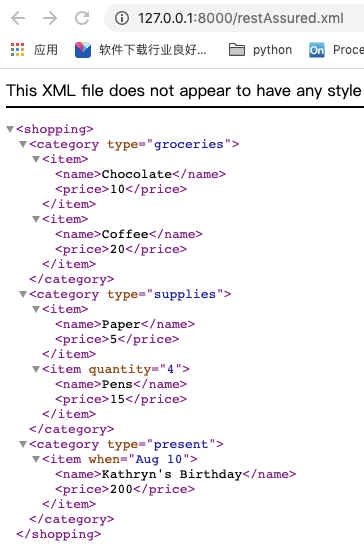
若我们要对第二个 name 的值 Coffee 进行断言,写法如下:
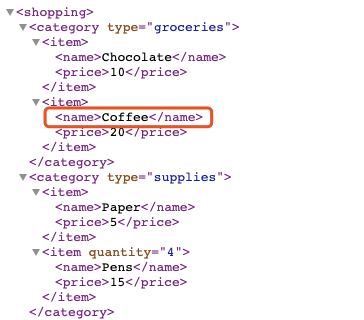
@Test
void testXML(){
when().get("http://127.0.0.1:8000/restAssured.xml").then().log().all().body("shopping.category[0].item[1].name",equalTo("Coffee"));
}
size()
可以利用 size() 方法来获取对应节点的数量,例如这里要断言 category 的数量:
@Test
void testXML(){
when().get("http://127.0.0.1:8000/restAssured.xml").then().log().all().body("shopping.category.size()",equalTo(3));
}
it.@type、it.price
在 xml中 断言中,可以利用 it. 属性或节点的值来作为筛选条件;
例如这里要获取 type 为 supplies 的 category 下的第一个 item 的 name,以及获取 price 为 10 的商品名 name。
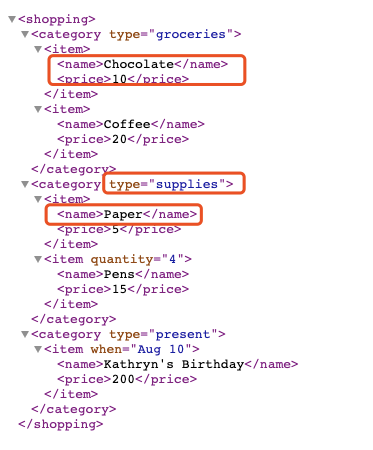
@Test
void testXML(){
when().get("http://127.0.0.1:8000/restAssured.xml").hen().log().all().body("shopping.category.findAll{ it.@type == 'supplies' }.item[0].name",equalTo("Paper")).body("shopping.category.item.findAll{ it.price == 10 }.name",equalTo("Chocolate"));
}
.findAll
对于xml中有一个特别的语法,.findAll,可以直接忽略前面的节点,直接对筛选条件进行匹配,依然获取price为10的商品名name,写法如下:
@Test
void testXML(){
when().get("http://127.0.0.1:8000/restAssured.xml").then().log().all().body("**.findAll{ it.price == 10 }.name",equalTo("Chocolate"));
}
将上述各个断言语法写在一起,实际运行校验结果:
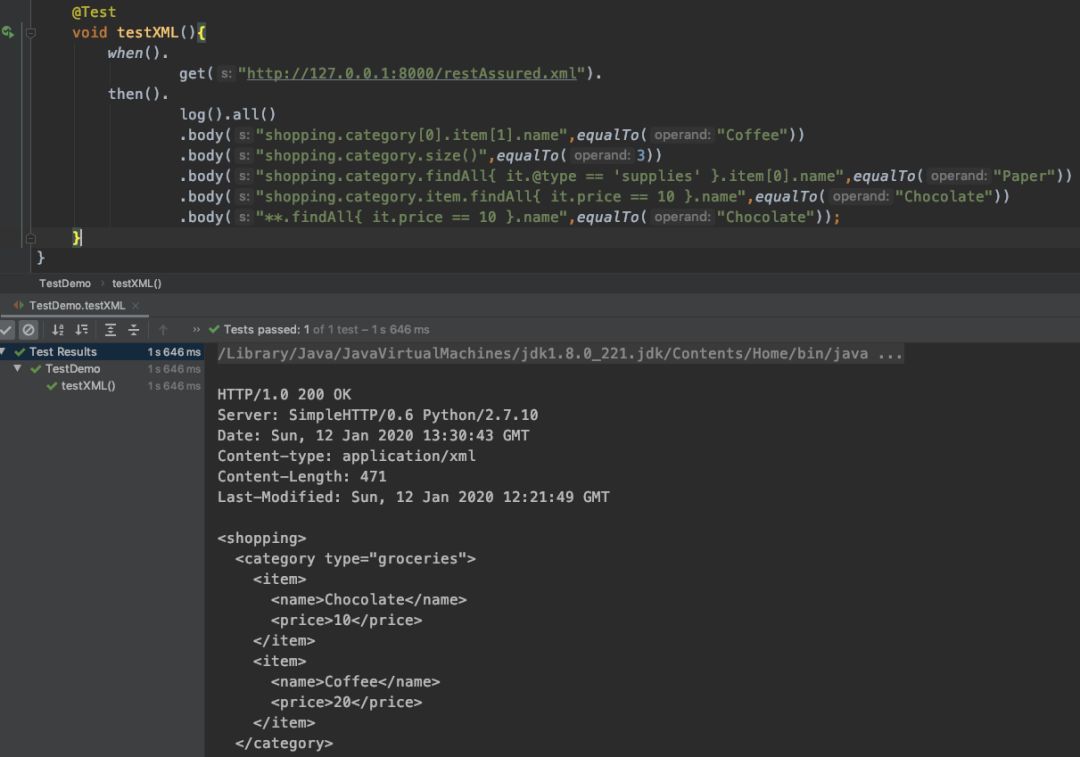
在实际工作中,对接口返回值进行断言校验,除了常用字段的断言检测以外,还要对其他字段的类型进行检测,原因在于:
- 返回字段较多,无法保证每个字段都写断言
- 防止客户端未做 null 值的校验判断,如果因为版本变更或网络等原因造成某个不能接收 null 值的返回字段为 null,就很有可能造成软件的崩溃
某些数值是不能为负的 - 小数点保留位数,对于股票的交易、医疗数据的分析,小数点的精确度都是有其实际价值的
对返回的字段一个个写断言显然是非常耗时的,这个时候就需要一个模板,可以定义好数据类型和匹配条件,除了关键参数外,其余可直接通过此模板来断言,这个就要请出JsonSchema了
先对上述的 json 例子做少许修改,增加一个 String 类型的 winnername 字段,这里可以先你不用疑惑为什么加,后续自有其演示作用
1)首先要借助于Json schema tool的网站https://www.jsonschema.net/,将返回json字符串复制到页面左边,然后点击INFER SHCEMA,就会自动转换为schema json文件类型,会将每个地段的返回值类型都设置一个默认类型; 在pattern中也可以写正则进行匹配
2)点击“设置”按钮会出现各个类型返回值更详细的断言设置,这个就是schema最常用也是最实用的功能,也可以对每种类型的字段最更细化的区间值校验或者断言,例如长度,取值范围等,具体感兴趣的话可以从官网学习深入学习;平常对重要字段的校验我通常会选用其他断言,比如hamcrest断言
3)选择复制功能,可以将生成的schema模板保存下来
4)添加maven依赖,在rest-assured完成支持
<groupId>io.rest-assured</groupId>
<artifactId>json-schema-validator</artifactId>
<version>4.0.0</version>
</dependency>
5)使用matchesJsonSchemaInClasspath方法对响应结果进行schema断言
@Test
void jsonSchemaTest(){
get("http://127.0.0.1:8000/restAssured.json").
then().log().all()
.body(matchesJsonSchemaInClasspath("jsonSchema.json"));
}
运行结果:
- String类型的默认值为null,后端很有可能在某个字段无值时返回null,例如我们将之前添加的winnername字段返回null:

运行查看断言结果:

很明显用例执行失败,当我们定义了winnername为String类型后,返回null就会断言失败,这显然不符合我们的需求,会造成用例执行结果的误判,这个时候我们需要使winnername即可以为String类型,又可以为null;
这就要用到jsonSchema提供的Combining schemas方法了 Combining schemas提供了如下几种方式: - allOf
- anyOf
- oneOf
- not
这里我们选取anyOf(任何一项满足即可)来完成上述的举例,将原来的type换成String和null任何一个都支持的类型:

再次运行用例,查看断言结果:
用例完美通过,到此结束~
断言的语法不止上述列出的这些,但是日常工作中绝大部分需求都可以满足,如有需要可参考官方文档进去研究:
JsonPath:
https://www.javadoc.io/doc/io.rest-assured/json-path/latest/io/restassured/path/json/JsonPath.html
XmlPath:
https://www.javadoc.io/doc/io.rest-assured/xml-path/latest/io/restassured/path/xml/XmlPath.html
JsonSchema:
https://json-schema.org/understanding-json-schema/
另外,在我们实际工作中,很多时候并不是直接对响应结果直接断言,我们可能需要获取响应结果中的某些值,将这些值传递到下一个接口或者和其他接口的响应进行比较断言,这就涉及到了对响应 response 的获取与处理了,后续文章继续探讨。
原文链接
获取更多内容:https://qrcode.testing-studio.com/f?from=hwyun&url=https://ceshiren.com/t/topic/16586
- 点赞
- 收藏
- 关注作者

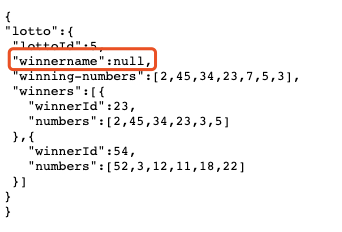

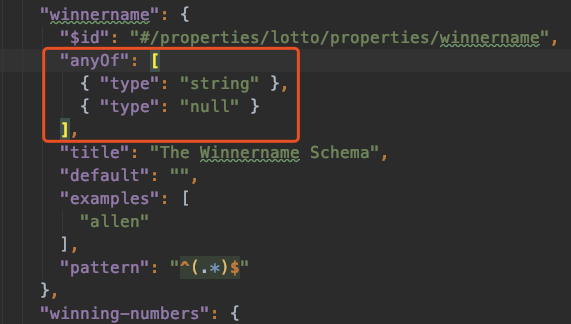

评论(0)